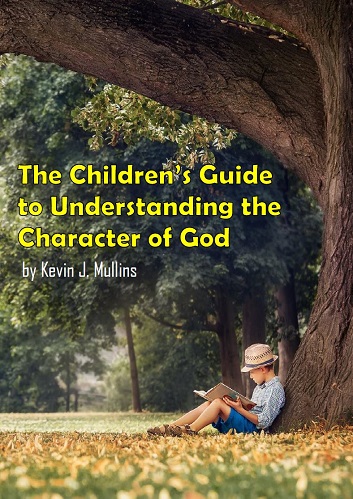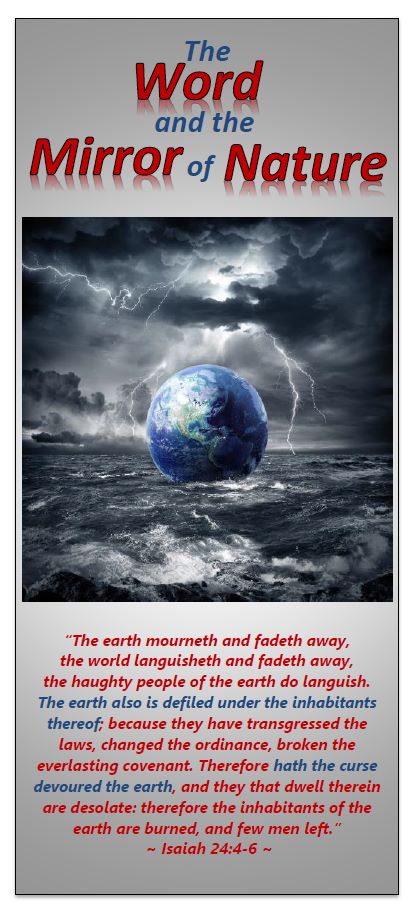(Genesis 6:1-7) Didn’t God Have to Exterminate the Nephilim Who Were the Hybrid Offspring of Fallen Angels and Human Women?
“And it came to pass, when men began to multiply on the face of the earth, and daughters were born unto them, That the sons of God saw the daughters of men that they were fair; and they took them wives of all which they chose … There were giants (Nephilim) in the earth in those days; and also after that, when the sons of God came in unto the daughters of men, and they bare children to them, the same became mighty men which were of old, men of renown … And the LORD said, I will destroy man whom I have created from the face of the earth; both man, and beast, and the creeping thing, and the fowls of the air; for it repenteth Me that I have made them.” (Genesis 6:1, 2, 4, 7)
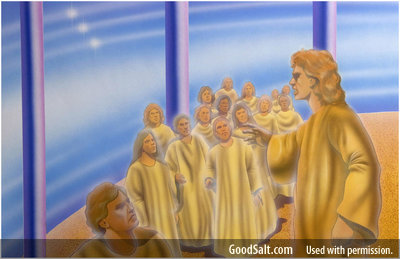 There are many who teach that God had to destroy the inhabitants who lived before the flood due to what we read in Genesis 6 concerning “giants” and the “sons of God.” The Hebrew word for “giants” here in the King James Version is נְפִיל (nephilim). It comes from the root word נָפַל (naphal), which means: “to fall.” Nephilim is defined as: “fallen ones, bullies or tyrants.”
There are many who teach that God had to destroy the inhabitants who lived before the flood due to what we read in Genesis 6 concerning “giants” and the “sons of God.” The Hebrew word for “giants” here in the King James Version is נְפִיל (nephilim). It comes from the root word נָפַל (naphal), which means: “to fall.” Nephilim is defined as: “fallen ones, bullies or tyrants.”
One very popular teaching is that the “sons of God” are fallen angels who mated with human daughters of men which produced supernatural giants (Nephilim) in the land; and it is because of this corrupt seed that God had to destroy the inhabitants. One of the reasons they come to this conclusion is by reading the book of Job:
“Now there was a day when the sons of God came to present themselves before the LORD, and Satan came also among them.” (Job 1:6)
“Again there was a day when the sons of God came to present themselves before the LORD, and Satan came also among them to present himself before the LORD.” (Job 2:1)
Here we definitely see angelic beings called “the sons of God.” However, notice that Satan, who is a fallen angel, is NOT grouped in with the sons of God. He is an extra guest or an uninvited guest who no longer carries the title nor experiences the blessing of being a son of God by his own choice.
In another passage in the book of Job we read God speaking of His Creation saying:
“Where wast thou when I laid the foundations of the earth? declare, if thou hast understanding. Who hath laid the measures thereof, if thou knowest? or who hath stretched the line upon it? Whereupon are the foundations thereof fastened? or who laid the corner stone thereof; When the morning stars sang together, and all the sons of God shouted for joy?” (Job 38:4-7)
Here again we see that “the sons of God” are definitely angelic beings all singing and shouting for joy when God created this world.
Another source people refer to is the so-called book of Enoch. The older sections of the book of Enoch are estimated to date from about 300–200 B.C, while the latest parts probably to 100 B.C. Several fragments of the 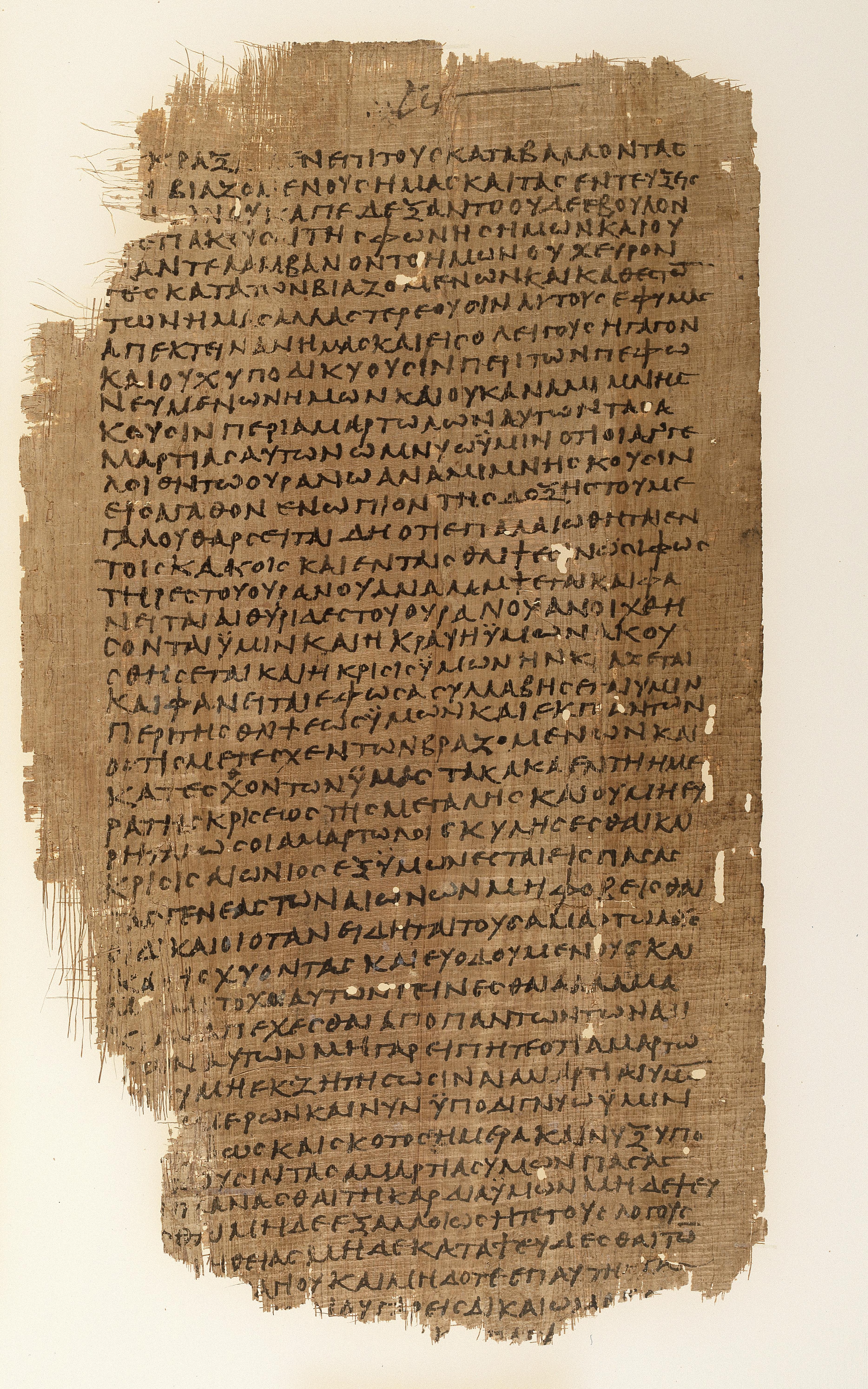 book of Enoch in Aramaic, Greek and Latin were found among the Dead Sea Scrolls which have led modern readers to believe the book is divinely inspired.
book of Enoch in Aramaic, Greek and Latin were found among the Dead Sea Scrolls which have led modern readers to believe the book is divinely inspired.
When describing the events surrounding the flood, the book of Enoch describes the angels as being “the sons of heaven” who desired to mate with the daughters of men:
“And when the angels, the sons of heaven, beheld them [the daughters of men], they became enamoured of them, saying to each other, Come, let us select for ourselves wives from the progeny of men, and let us beget children.” (1 Enoch 7:2, 3)
So yes, it is understandable why people could come up with the theory that it was fallen angels (fallen sons of God) who mated with human women, which produced supernatural giants half angel (or demon) and half human. Here’s a description of this belief on the official Jehovah’s Witness website (JW.org):
“The Nephilim were giants, the violent superhuman offspring produced when wicked angels mated with human women in the days of Noah. The Bible account says that ‘the sons of the true God began to notice that the daughters of men were beautiful.’ (Genesis 6:2) Those ‘sons of God’ were actually spirit creatures who rebelled against God when they ‘forsook their own proper dwelling place’ in heaven, materialized human bodies, and ‘began taking as wives all whom they chose.’—Jude 6; Genesis 6:2. The hybrids born from this unnatural union were no ordinary children. (Genesis 6:4) The Nephilim were giant bullies, tyrants who filled the earth with violence. (Genesis 6:13) The Bible describes them as ‘the mighty ones of old times, the men of fame.’ (Genesis 6:4) They left behind a legacy of violence and fear.—Genesis 6:5; Numbers 13:33.”
We will discuss the passage they mention in Jude 6 later on in this study. The article continues to suggest the common view that it was because of these superhuman hybrids that God had to destroy the earth with a flood:
“Jehovah caused a global flood to destroy that violent ancient world. The Nephilim were wiped out along with all wicked people. In contrast, Noah and his family found favor with Jehovah and were the only ones preserved alive at that time.—Genesis 6:9; 7:12, 13, 23; 2 Peter 2:5 … The context of Genesis 6:4 indicates that the Nephilim were, not angels, but hybrid offspring born from sexual relations between materialized angels and women. After the angels ‘began taking as wives all whom they chose,’ Jehovah said that in 120 years he would take action against the ungodly world of that time. (Genesis 6:1-3) The account adds that ‘in those days,’ the materialized angels ‘continued to have relations with the daughters of men’ and that they produced ‘the mighty ones of old times,’ the Nephilim.—Genesis 6:4.”
Again, the focal point here is that it’s because of this hybrid that God HAD to destroy the inhabitants at that time. Thus God’s genocidal act against this race is justified to those who hold this view.
Another View
Another view that is more in tune with the whole Bible is that, although God’s angels are called “sons of God”, both the sons of God and the Nephilim mentioned in Genesis 6 were fully human. The Hebrew word for “men” in the phrase “men of renown” (Genesis 6:4) is אֱנוֹשׁ (enosh) which simply means “man, mankind.” So, it is more probable that the offspring of “the sons of God” and “the daughters of men” were not supernatural giants who are part angel and part human but were fully human mighty and prideful men of high stature who were famous bullies and tyrants always attempting to make a name for themselves and sought their own honor and glory. The phrase “men of renown” means, “men of name.” In contrast, the followers of the one true God seek His honor and glory. Like King David, in ancient times righteous kingly rulers and high priests were called “sons of God” who honored God’s name:
“Now therefore so shalt thou say unto My servant David, Thus saith the LORD of hosts, I took thee from the sheepcote, from following the sheep, to be ruler over My people, over Israel … He shall build an house for My name, and I will establish the throne of his kingdom forever. I will be his father, and he shall be My son …” (2 Samuel 7:8, 13, 14)
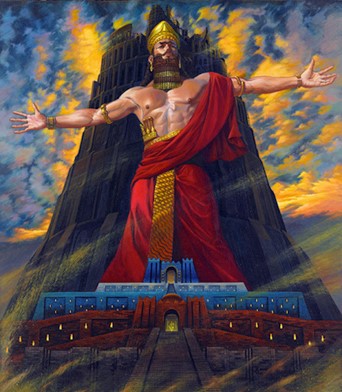 In Genesis 10:8 we read of Nimrod who was “a mighty one in the earth.” The Hebrew word used for “mighty one” or "mighty man" is גִּבּוֹר (gibbor). In Genesis 6 the Nephilim are called “mighty men … men of name.” The Hebrew word for “mighty men” is the plural form of the same Hebrew word gibbor — gibborim. Nimrod wasn’t a hybrid of angel and human, but was a fully human descendant of Cush, his human father: “And Cush begat Nimrod: he began to be a mighty one (gibbor) in the earth” (Genesis 10:8).
In Genesis 10:8 we read of Nimrod who was “a mighty one in the earth.” The Hebrew word used for “mighty one” or "mighty man" is גִּבּוֹר (gibbor). In Genesis 6 the Nephilim are called “mighty men … men of name.” The Hebrew word for “mighty men” is the plural form of the same Hebrew word gibbor — gibborim. Nimrod wasn’t a hybrid of angel and human, but was a fully human descendant of Cush, his human father: “And Cush begat Nimrod: he began to be a mighty one (gibbor) in the earth” (Genesis 10:8).
In Genesis 6 we are told these kingly and priestly rulers became corrupt by lusting after the beautiful women and advanced the sinful practice of intermarriage with unbelievers and polygamy — “and they took them wives of all which they chose.” The themes of the sins in Genesis 4 (namely Cain’s selfish pride; his violent killing of Abel; and Lamech introducing the practice of polygamy) carry on in the theme of Genesis 6 — Polygamy, violence and selfish pride.
Just as the Nephilim in Genesis 6 sought after making a name for themselves, followed by the flood, Nimrod and the inhabitants of Babel built a tower exclaiming, “Let us make a name for ourselves” (Genesis 11:1-6), followed by God confusing the languages and scattering the people (Genesis 11:1-9). After the flood, God calls on Noah to repopulate the earth (Genesis 9). After the destruction of the tower of babel, God calls on Abraham to re-establish His everlasting covenant (Genesis 12). God promised Abraham, “And I will make of thee a great nation, and I will bless thee, and make thy name great; and thou shalt be a blessing … in thee shall all families of the earth be blessed.” The promise to Abraham was not merely a small piece of land, but that “he should be the heir of the world” (Romans 4:13). Paul says, “And if ye be Christ’s, then are ye Abraham’s seed, and heirs according to the promise” (Galatians 3:29). Thus God will re-establish His children in Christ who “hast made us unto our God kings and priests: and we shall reign on the earth” (Revelation 5:10).
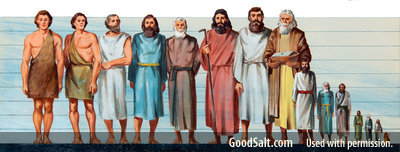 With this understanding, the sons of God mentioned are not fallen angels (spirit creatures) but human men whose kingly and priestly ancestry were known as “the sons of God” but have fallen from that noble title. This righteous ancestry line would thus begin with Adam, then to Seth (since Abel was killed and Cain forfeited his sonship through unbelief) and so forth down through the generations. When we come to the time of the flood, the male offspring of Seth were in a state of rebellion and began to mingle with the corrupt daughters of Cain’s offspring. In fact, the Amharic Ethiopian Orthodox Bible also contains the so-called book of Enoch (Henok). However, it differs greatly from western academic editions when it comes to the story of the sons of God:
With this understanding, the sons of God mentioned are not fallen angels (spirit creatures) but human men whose kingly and priestly ancestry were known as “the sons of God” but have fallen from that noble title. This righteous ancestry line would thus begin with Adam, then to Seth (since Abel was killed and Cain forfeited his sonship through unbelief) and so forth down through the generations. When we come to the time of the flood, the male offspring of Seth were in a state of rebellion and began to mingle with the corrupt daughters of Cain’s offspring. In fact, the Amharic Ethiopian Orthodox Bible also contains the so-called book of Enoch (Henok). However, it differs greatly from western academic editions when it comes to the story of the sons of God:
“and the Offspring of Seth, who were upon the Holy Mount, saw them [the daughters of men] and loved them. And they told one another, ‘Come, let us choose for us daughters from Cain's children; let us bear children for us.’” (Henok 2:1-3)
Jesus seems to support this idea when He refers to the time of Noah and the intermarriage of the righteous line and unrighteous line going on at that time:
“But as the days of Noah were, so shall also the coming of the Son of man be [referring to His second coming]. For as in the days that were before the flood they [humans] were eating and drinking, marrying and giving in marriage, until the day that Noah entered into the ark, And knew not until the flood came, and took them all away; so shall also the coming of the Son of man be.” (Matthew 24:37-39)
Clearly there’s nothing wrong with the God-given privilege of marriage. Jesus is speaking about marriage between unequally yoked partners (see 2 Corinthians 6:14). He’s also clearly speaking of human marriages.
Another quote from Jesus many refer to is found in Matthew 22 where Jesus tells us that “in the resurrection” we will “neither marry, nor are given in marriage, but are as the angels of God in heaven” (verse 30). The conclusion is that angels are not capable of pro-creating and thus it could not have been angels mingling with human women at the time of Noah. However, admittedly, the case could be made that Jesus is only referring to “the angels of God in heaven” and not to the fallen angels who are no longer in heaven. Perhaps they have figured out a way to manipulate their biological design in order to be able to pro-create with humans. But that’s quite a stretch.
“References to the offspring of Seth rebelling from God and mingling with the daughters of Cain are found from the second century CE onwards in both Christian and Jewish sources (e.g. Rabbi Shimon bar Yochai, Augustine of Hippo, Sextus Julius Africanus, and the Letters attributed to St. Clement) … Orthodox Judaism has taken a stance against the idea that Genesis 6 refers to angels or that angels could intermarry with men … Consequently, most Jewish commentaries and translations describe the Nephilim as being from the offspring of ‘sons of nobles’, rather than from ‘sons of God’ or ‘sons of angels.' This is also the rendering suggested in the Targum Onqelos, Symmachus and the Samaritan Targum, which read ‘sons of the rulers’, where Targum Neophyti reads ‘sons of the judges.’ Likewise, a long-held view among some Christians is that the ‘sons of God’ were the formerly righteous descendants of Seth who rebelled, while the ‘daughters of men’ were the unrighteous descendants of Cain, and the Nephilim the offspring of their union.” (Wikipedia)
The Divine Pattern of all Relationships
When we understand the family union between our heavenly Father and His only begotten Son Jesus, as They lovingly and selflessly submit Themselves one to another, we begin to understand the divine pattern of all relationships. In his letter to the church in Corinth, Paul wote:
"But I would have you know, that the head of every man is Christ; and the head of the woman is the man; and the head of Christ is God." (1 Corinthians 11:3)
This headship is not a dictatorship or of forced dominance. Paul is talking about a channel of blessing which flows from God to Christ; from Christ to man; and from man to woman. It has nothing to do with who is higher or lower, as if the woman is the lowest of the human species. Jesus said, "Whoever wants to be first must place himself last of all and be the servant of all" (Mark 9:35). It's all about serving one another. At another time, Jesus said, "For even the Son of Man [the Messiah/Jesus] did not come to be served, but to serve, and to give His life as a ransom for many” (Mark 10:45). As the head of Christ, God serves and blesses His only begotten Son. As the head of man, the Son serves and blesses man. As head of the woman, the man serves and blesses the woman. The woman then blesses and serves the children.
This is the divine pattern of life which, if unbroken, returns the serving and blessing back to God who gave it. Just as Christ is the brightness of the Father's glory (Hebrews 1:3), "the woman is the glory of the man" (1 Corinthians 11:7). Therefore, "husbands, love your wives, even as Christ also loved the church, and gave Himself for it" (Ephesians 5:25). As the head of the woman, the man is to love, bless, serve, and give himself for her. This is the divine appointed position of the family relationship as it reflects the relationship between the heavenly Father and His Son. At Creation, God said to His Son, "Let Us make mankind in Our image, after Our likeness" (Genesis 1:26). The Son of God always submits to the serving and blessing from His Father. As the man submits to the serving and blessing from Christ, he is able to serve and bless the woman as long as she is submissive to his serving and blessing. When submission is refused to be given by the man or the woman within the family unit, the channel of blessing is broken. It is for this reason that Satan has waged war on the family in order to break that channel of blessing. He wants to mar the image of God and His Son.
Pastor Adrian Ebens expounds on this thought:
“The book of Genesis is, among other things, a history of Satan’s war on the family and a consolidation of his principles of inherent life source. The tragedies are many and the highlights are few, but the history provided is very instructive for learning about the family. Genesis 4:19 indicates the first major departure from a monogamous marriage that reflects the Father and Son relationship. Lamech took two wives. The introduction of a second wife confused the channel of blessing process and made the wives vulnerable to competing for the affection of their one husband. Chapter 6 of Genesis reveals the next major tactic of Satan to destroy families.
Genesis 6:2 ‘That the sons of God saw the daughters of men that they were fair; and they took them wives of all which they chose.’
The word ‘son’ gives the sense of a builder of the family name. The sons of God then were men who wished to build the family kingdom of God and extend the principles of dependent life source and the vital nature of blessing. The daughters of men were raised in families that lived without the principle of submission and the importance of the blessing [Ephesians 5:20-25,28,29]. Satan enticed the sons of God to marry these women. The Bible states that these women were fair or beautiful. This could only be in an external sense, for the children they bore were tyrants and bullies. The inference here is that daughters who lack the blessing of God through their fathers will gravitate towards and focus on beautifying themselves externally to compensate for the lack of blessing. Sadly, the sons of God did not look for the inward beauty of a woman who understood the vital role of a submissive nurturer who would draw down the blessing of God through her husband upon her children [Colossians 3:18-21]. The union of the sons of God with insecure daughters of men turned their families from builders of God’s family name to builders of Satan’s kingdom. Since the wives were not of a submissive spirit, there was no example in the home for the children to learn submission and connection to the blessing. Such children rose to be men of renown: meaning men who sought power, glory and honour through a spirit of independence. Within a short space of time, the role of the submissive agent was completely lost and the blessing of God was largely cut off. And the result was:
Genesis 6:5 ‘…that the wickedness of man was great in the earth, and that every imagination of the thoughts of his heart was only evil continually.’
Romans 1:21-23 ‘Because that, when they knew God, they glorified him not as God, neither were thankful; but became vain in their imaginations, and their foolish heart was darkened. Professing themselves to be wise, they became fools, And changed the glory of the uncorruptible God into an image made like to corruptible man, and to birds, and fourfooted beasts, and creeping things.’
Within a period of just over 1500 years, the human family blessing structure had been virtually obliterated. The image of the Father and Son relationship, which should have been reflected in the husband and wife relationship, was replaced with vain imaginations of inherent power and the worship of ‘inherent power’ in nature. The union of the sons of God with the daughters of men had produced tyrants that only thought ‘evil continually.’ In reality these tyrants were insecure wavering boys in men’s bodies that lived to serve their lusts and desires and had no regard for the sacred responsibility of raising children that are honest, firm and true … The first few chapters of Genesis should be enough to convince us of the horrific effects of Satan’s lie of inherent life source and the impacts of the loss of blessing to children … Who can speak of the trauma and tragedy of children born into these families without the blessing of God flowing through their fathers? God intervened by calling Noah and giving the heavenly family model a chance to start again.” (Arian Ebens, Life Matters, pp. 74-76)
“My Spirit Shall Not Always Strive with Man”
Another clue as to who the “Sons of God” are is found in what God says right after describing the intermarriages going on at that time:
“And the LORD said, My Spirit shall not always strive with man, for that he also is flesh: yet his days shall be an hundred and twenty years.” (Genesis 6:3)
The Hebrew word Moses uses for the word “man” is אָדָם which is the word “Adam.” Moses uses the same word in Genesis 5:1, 2 where he writes:
 “This is the book of the generations of Adam. In the day that God created man [אָדָם], in the likeness of God made He him; Male and female created He them; and blessed them, and called their name Adam [אָדָם], in the day when they were created.”
“This is the book of the generations of Adam. In the day that God created man [אָדָם], in the likeness of God made He him; Male and female created He them; and blessed them, and called their name Adam [אָדָם], in the day when they were created.”
The word is obviously referring to the union of Adam and Eve as being mankind who is made of “flesh.”
“And GOD saw that the wickedness of man [אָדָם/Adam] was great in the earth, and that every imagination of the thoughts of his heart was only evil continually. And it repented the LORD that He had made man [אָדָם/Adam] on the earth, and it grieved Him at His heart [He felt sorry for us and had compassion on us]. And the LORD said, I will destroy man [אָדָם/Adam] whom I have created from the face of the earth; both man [אָדָם/Adam], and beast, and the creeping thing, and the fowls of the air; for it repenteth Me that I have made them.” (Genesis 6:5-7)
According to the contextual narrative of Genesis 6, it is mankind (flesh and blood beings) alone who are the guilty party of grieving God’s Spirit at the time of the flood. When Adam transgressed in the garden, he forfeited his dominion and the spirit of rebellion extended throughout the animal kingdom. When he rebelled against the divine Law, the inferior creatures were in rebellion against his rule. Thus, the inherent judgment that was coming upon the earth at the time of the flood came upon mankind, the beasts, the creeping thing, and the fowls of the air. Nothing is said concerning a judgment against angels (or spirit beings) or any supernatural hybrids part human and part angel. Angels are not flesh, but “ministering spirits” (Hebrews 1:14). This is why Jesus had to become flesh:
“But we see Jesus, who was made a little lower than the angels for the suffering of death, crowned with glory and honour; that He by the grace of God should taste death for every man … Forasmuch then as the children are partakers of flesh and blood, He also Himself likewise took part of the same; that through death He might destroy him that had the power of death, that is, the devil; And deliver them who through fear of death were all their lifetime subject to bondage. For verily He took not on Him the nature of angels; but He took on Him the seed of Abraham [flesh and blood].” (Hebrews 2:9, 14-16)
 It’s not a coincidence that the word “Adam” comes up here in connection with the human ancestry line of “the sons of God.” In Luke chapter 3, Luke traces Jesus’ genealogy all the way back to Seth and Adam. Notice the wording he uses at the close of his list:
It’s not a coincidence that the word “Adam” comes up here in connection with the human ancestry line of “the sons of God.” In Luke chapter 3, Luke traces Jesus’ genealogy all the way back to Seth and Adam. Notice the wording he uses at the close of his list:
“… Enos, which was the son of Seth, which was the son of Adam, which was the son of God.” (Luke 3:38)
The New Testament Witness
As we move into the New Testament writings, this study would be incomplete if we did not discuss Jude 1:6, 7:
“And the angels which kept not their first estate, but left their own habitation, He hath reserved in everlasting chains under darkness unto the judgment of the great day. Even as Sodom and Gomorrha, and the cities about them in like manner, giving themselves over to fornication, and going after strange flesh, are set forth for an example, suffering the vengeance of eternal fire.” (Jude 1:6, 7)
Many teachers believe Jude is drawing from the book of Enoch when describing the angels who “kept not their first estate, but left their own habitation.” In verses 14 and 15 Jude mentions Enoch and recites a passage from the book of Enoch found in 1 Enoch 1:9. The claim is then made that Jude must believe in the teachings found in the book of Enoch, thus he believed and taught that the sons of God who mated with the daughters of men were the fallen angels, which resulted in the hybrid species known as the Nephilim.
The interpretation is commonly that the angels who “left their habitation” are likened to the inhabitants of Sodom and Gomorrah who gave “themselves over to fornication” and went after “strange flesh.” However, what Jude is comparing is the judgment of “everlasting chains under darkness” and “eternal fire.” Leaving their first estate and own habitation means they desired to leave their divinely appointed positions and to selfishly rise higher than they were created. John Gill explains:
“And the angels which kept not their first estate, … Or ‘principality’; that holy, honourable, and happy condition, in which they were created; for they were created in perfect holiness and righteousness, stood in the relation of sons to God, and were, for the lustre of their nature, comparable to the morning stars; they were among the thrones, dominions, principalities, and powers; were a superior rank of creatures to men, and who beheld the face, and enjoyed the presence of God; but this estate they kept not, for being mutable creatures, one of them first sinning [Lucifer/Satan], the rest were drawn into it by him, and so were not what they were before, nor in the same estate, or place:
‘but left their own habitation’; by attempting to rise higher [see Isaiah 14:12-14]; or by quitting their station and posts of honour, being unwilling to be subject to God, and especially to the Son of God, who was to assume human nature, and in it be above them, which they could not bear.”
The comparison of “everlasting chains under darkness” and the “eternal fire” is the unremedied mental torment of sin and guilt upon their conscience. Contrary to popular belief, God does not torture people in literal everlasting fire. Please see the article entitled: Doesn’t the Bible Say That God Will Burn and Torture people “Forever and Ever”? for more details on this.
The angels who left their positions, along with the inhabitants of Sodom and Gomorrah, rejected to honor the name (character) of God and His Son and set out to make a name for themselves. Satan and his angels influenced Cain who in turn influenced all humans, including the sons of God and the Nephilim, by flooding the earth with the inherited character of tyranny, violence and selfish pride. This is why Jude continues and warns, “Woe to them! For they have gone in the way of Cain, have run greedily in the error of Balaam for profit, and perished in the rebellion of Korah” (Jude 1:11).
What is this judgment that awaits them? How did Korah perish? By falling into a pit (Numbers 16:31-33). Did God cause the earth to open and swallow them alive out of His anger and utter hatred for these wayward children? Is this God’s judgment and justice? No. He simply visited their iniquity upon them by allowing the earth to mirror the “pit” they had dug for themselves. Please see the article entitled: Did God Kill Korah, Dathan, and Abiram?
Notice the way the Psalmist explains how God’s judgment and justice operates:
“See the one who is pregnant with wickedness, who conceives destructive plans, and gives birth to harmful lies – he digs a pit and then falls into the hole he has made. He becomes the victim of his own destructive plans and the violence he intended for others falls on his own head. I will thank the Lord for HIS JUSTICE; I will sing praises to the sovereign Lord!” (Psalm 7:14-17, New English Translation)
“The heathen are sunk down in the pit that they made: in the net which they hid is their own foot taken. The LORD is known by THE JUDGMENT which He executeth: the wicked is snared in the work of his own hands.” (Psalm 9:15, 16)
For more info about how God's wrath, justice and judgment work, see the article: What is God's Wrath?
In Jude 1:9, Jude makes a statement that many believe comes from another extra Biblical book called “the Assumption (or Testament) of Moses.” Again, is Jude really drawing citations from these books believing they are inspired works from God? Or is he simply drawing these judgment-like citations out to emphasize them to his opponents who held these books as being authoritative in order to drive his point home? Could it be that Jude is referencing fiction material to make his point, such as a preacher may refer to the fictional story of Star Wars to draw visual parallels concerning the fall of Satan and the salvation of mankind? Could he be citing their own documents in such a way as to bring them back on their own heads?
 After all, Paul did the same thing when he quoted from the pagan Greek poets while he was in Athens. He says that God “is not far from each one of us; for in Him we live and move and have our being, as also some of your own poets have said, ‘For we are also His offspring.’ Therefore, since we are the offspring of God, we ought not to think that the Divine Nature is like gold or silver or stone, something shaped by art and man’s devising” (Acts 17:27-29). Again, Paul is citing from non-inspired writings and drawing things out in order to drive his point home to those who held these writings in high esteem. It definitely does not mean that Paul or Jude considered these writings as authoritative divine doctrines.
After all, Paul did the same thing when he quoted from the pagan Greek poets while he was in Athens. He says that God “is not far from each one of us; for in Him we live and move and have our being, as also some of your own poets have said, ‘For we are also His offspring.’ Therefore, since we are the offspring of God, we ought not to think that the Divine Nature is like gold or silver or stone, something shaped by art and man’s devising” (Acts 17:27-29). Again, Paul is citing from non-inspired writings and drawing things out in order to drive his point home to those who held these writings in high esteem. It definitely does not mean that Paul or Jude considered these writings as authoritative divine doctrines.
Jesus did the same when He spoke to the people in parables. The parable of the rich man and Lazarus being one such example. In this parable, Christ was meeting the people on their own ground. The doctrine that the human soul goes directly to heaven or a place of burning after death was held by many of those who were listening to Christ’s words. Jesus framed His parable so as to draw out visual parallels from these preconceived opinions to present a theological truth. He metaphorically held up a mirror wherein they might see themselves in their true relation to God. Like Jude and Paul, He used the prevailing opinion of the day to convey the idea He wished to make prominent to all. Please see the article entitled: Didn’t Jesus Teach That People Go Directly to Heaven or a Place of Burning in the Story of the Rich Man and Lazarus? for more info.
 When the Canaanite woman begged Jesus to heal her daughter, Jesus again used the prevailing opinion of the day to teach an eternal truth. Jesus responded to her saying, “I was not sent except to the lost sheep of the house of Israel” (Matthew 15:24). After pressing the issue further, Jesus replies, “It is not good to take the children’s bread and throw it to the little dogs” (verse 26). Why was Jesus treating her this way? He was simply framing His words to mirror the thoughts of what the woman thought of herself and to mirror the thoughts of His own disciples. The disciples eagerly told Jesus, “Send her away, for she cries out after us” (verse 23). By framing His words in this way, Jesus was drawing out the prevailing prejudice of the day in order that they all see their error and repent of this sin. In the end of His lesson, Jesus boldly says to this faithful woman, “O woman, great is your faith! Let it be to you as you desire” and her daughter was healed from that very hour (verse 28). Even though she was a Gentile, she was clearly a lost sheep of the house of Israel in Jesus’ eyes! See the article entitled: Did Jesus Call the Canaanite Woman a Dog? for details on this.
When the Canaanite woman begged Jesus to heal her daughter, Jesus again used the prevailing opinion of the day to teach an eternal truth. Jesus responded to her saying, “I was not sent except to the lost sheep of the house of Israel” (Matthew 15:24). After pressing the issue further, Jesus replies, “It is not good to take the children’s bread and throw it to the little dogs” (verse 26). Why was Jesus treating her this way? He was simply framing His words to mirror the thoughts of what the woman thought of herself and to mirror the thoughts of His own disciples. The disciples eagerly told Jesus, “Send her away, for she cries out after us” (verse 23). By framing His words in this way, Jesus was drawing out the prevailing prejudice of the day in order that they all see their error and repent of this sin. In the end of His lesson, Jesus boldly says to this faithful woman, “O woman, great is your faith! Let it be to you as you desire” and her daughter was healed from that very hour (verse 28). Even though she was a Gentile, she was clearly a lost sheep of the house of Israel in Jesus’ eyes! See the article entitled: Did Jesus Call the Canaanite Woman a Dog? for details on this.
It is also important to know that the book of Enoch was used in Rabbinical studies as a Midrash, which is only a rabbinic mode of interpretation of a biblical passage. Referring to the Midrash, Wilda Gafney writes that the Rabbis would “reimagine dominant narratival readings while crafting new ones to stand alongside—not replace—former readings” (Womanist Midrash: a reintroduction to the women of the Torah and the throne).
Every male from the righteous line of Adam and Seth, who desired a knowledge of the one true God and was born of God (born again), held the title “sons of God.” When we allow the New Testament Scriptures to be the brightness and magnification of the Old Testament Scriptures (just as Christ is the brightness and glory of the Father, Hebrews 1:1-3) we have a full and complete understanding of who the sons of God are.
1. The sons of God are those who receive Christ:
“But as many as received Him (Christ), to them gave He power to become the sons of God, even to them that believe on His name.” (John 1:12)
When we receive Christ, we become sons (or children) of God because we are receiving the only begotten Son of God and we become heirs with Christ. Christ is not a son by creation, as were the angels, but a Son begotten in the express image of the Father's person, and in all the brightness of His majesty and glory, one equal with God in authority, dignity, and divine perfection. He came forth from God “in the days of eternity” (Proverbs 8:22-30; Micah 5:2; John 8:42), thus in Him dwells all the fullness of the Godhead (divinity) bodily. We, as forgiven sinners however, become sons by adoption.
In Hebrews 1:5 the writer quotes Psalm 2:7 and 2 Samuel 7:14 applying it to Jesus: "For unto which of the angels said He (God) at any time, 'Thou art My Son, this day have I begotten Thee?' And again, 'I will be to Him a Father, and He shall be to Me a Son'?" Again we see that, although angels are called "sons of God", Jesus is the "only begotten Son" (John 3:16). He's the only Being who has come forth from God uncreated, thus He is God (divine) by nature through the inheritence He received from His divine Father (Hebrews 1:4-9).
Christ came “in the likeness of sinful flesh” (Romans 8:3) in order that …
“… we might receive the adoption as sons. And because ye are sons, God hath sent forth the Spirit of His Son into your hearts, crying, Abba, Father. Wherefore thou art no more a servant, but a son, and if a son, then heir of God through Christ.” (Galatians 4:5-8)
The Greek word for “sons” in the above verses in Galatians is υἱός (hyiós) which Strong’s Concordance defines as: “properly, a son (by birth or adoption); (figuratively) anyone sharing the same nature as their Father [2 Peter 1:4]. For the believer, becoming a son of God begins with being reborn (adopted) by the heavenly Father – through Christ (the work of the eternal Son) … hyiós (‘son’) emphasizes likeness of the believer to the heavenly Father, i.e. resembling His character more and more by living in faith.”
It’s very interesting that this word also refers to female believers:
“For in Christ Jesus you are all sons (hyiós) of God, through faith. For as many of you as were baptized into Christ have put on Christ. There is neither Jew nor Greek, there is neither slave nor free, there is no male and female, for you are all one in Christ Jesus.” (Galatians 3:26-28, English Standard Version)
The concept of being a son of God is therefore one who denies self and, like Christ, is fully dependent upon our heavenly Father, allowing Him to do for us that which is not in our power to do for ourselves (John 5:19; 8:28; 14:10; Luke 18:15,17).
2. The sons of God do not murmur and dispute and thus remain blameless and harmless:
“Do all things without murmurings and disputings: That ye may be blameless and harmless, the sons of God, without rebuke, in the midst of a crooked and perverse nation, among whom ye shine as lights in the world.” (Philippians 2:14, 15)
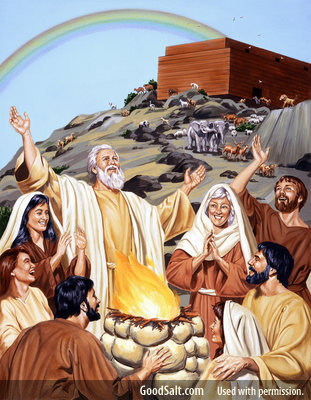 By receiving Christ and being led by Christ’s Spirit, Noah was called “a righteous man, blameless in his generation” (Genesis 6:9, Revised Standard Version). Between Genesis chapters 6 and 8 we are told 5 times that Noah and his three sons each had only one wife (Genesis 6:18; 7:7,13; 8:16,18), which contrasts with the fallen “sons of God” who “took them wives of all which they chose.”
By receiving Christ and being led by Christ’s Spirit, Noah was called “a righteous man, blameless in his generation” (Genesis 6:9, Revised Standard Version). Between Genesis chapters 6 and 8 we are told 5 times that Noah and his three sons each had only one wife (Genesis 6:18; 7:7,13; 8:16,18), which contrasts with the fallen “sons of God” who “took them wives of all which they chose.”
As a faithful son of God, Noah was not only blameless, but also harmless. He did not give in to the satanic spirit of violence which had filled the earth (Genesis 6:11).
3. The sons of God are peacemakers:
“Blessed are the peacemakers, for they shall be called sons of God.” (Matthew 5:9, English Standard Version)
Isaiah says, “unto us a Son is given … and His name shall be called … The Prince of Peace” (Isaiah 9:6). If the sons of God in Noah’s time had stayed in union with the Son of God, who is the Prince (source) of Peace, they would have been an influential channel of peace in the world. As a result, the earth itself would have stayed calm and the violence that was brewing would have been held in check by Jesus’ command, “Peace be still!” just as He calmed the waters while out on the violent sea (Mark 4:36-41).
4. The sons of God will be equal to the angels:
“And Jesus said to them, ‘The sons of this age marry and are given in marriage, but those who are considered worthy to attain to that age and to the resurrection from the dead neither marry nor are given in marriage, for they cannot die anymore, because they are equal to angels and are sons of God, being sons of the resurrection.’” (Luke 20:34-36, English Standard Version)
Here we see the reason why angels do not pro-create. There will be no need of marrying to procreate children, because “they cannot die” and thus no need to keep replenishing the species. It’s similar to the reason why there is no need for another High Priest since Jesus is an eternal High Priest:
“Now there have been many other priests, since death prevented them from continuing in office. But because Jesus lives forever, He has a permanent priesthood. Therefore He is able to save completely those who draw near to God through Him, since He always lives to intercede for them.” (Hebrews 7:23-25, Berean Study Bible)
5. The sons of God are like Christ whose lifestyle the world does not understand:
“Behold, what manner of love the Father hath bestowed upon us, that we should be called the sons of God: therefore the world knoweth [understands/experiences] us not, because it knew [understood/experienced] Him not. Beloved, now are we the sons of God, and it doth not yet appear what we shall be: but we know that, when He shall appear, we shall be like Him; for we shall see Him as He is.” (1 John 3:1, 2)
The Greek word for “sons” here is τέκνον (teknon). Although this word is most often translated as “child” or children”, it is translated as “son” or “sons” in 22 verses in the King James Version. Continuing on in 1 John chapter 3, the King James translators chose to translate the same word as “children”:
“He that committeth sin is of the devil; for the devil sinneth from the beginning. For this purpose the Son of God was manifested, that He might destroy the works of the devil … In this the children (teknon) of God are manifest, and the children (teknon) of the devil: whosoever doeth not righteousness is not of God, neither he that loveth not his brother.” (1 John 3:8, 10)
They could have easily translated it “sons” as they did in the prior verses. In fact, this is how it appears in the Catholic Public Domain Version:
“In this way, the sons of God are made manifest, and also the sons of the devil. Everyone who is not just, is not of God, as also anyone who does not love his brother.” (Verse 10)
In the next two verses John contrasts “the sons (children) of God” with those who act like Cain:
“For this is the message that ye heard from the beginning, that we [the children/sons of God] should love one another. Not as Cain, who was of that wicked one, and slew his brother. And wherefore [why] slew he him? Because his own works were evil, and his brother's righteous.” (1 John 3:11, 12)
This is great confirmation that the sons of God mentioned in Genesis chapter 6 are from the line of Seth (who replaced Abel) who mingled with the daughters from the offspring of Cain’s family tree.
If we are truly sons (children) of God, we will not act out in violence toward those who hate and persecute us. The world will not “know” (understand/experience) this concept without the Spirit of Christ in them. When their selfish pride is hurt, or when someone acts disrespectful to them, they act out in violent retaliation as Cain did against his brother Abel. We can experience the non-violent life of Christ in us as we return unto God’s design as revealed in His Law of love and freedom:
“And hereby we do know [understand/experience] that we know Him, if we keep His Commandments. He that saith, I know Him, and keepeth not His Commandments, is a liar, and the truth is not in him.” (1 John 2:3, 4)
As sons (children) of God, we will always treat others the way we want to be treated even while they hurt us:
 “But I [Jesus] say to you who hear, Love your enemies, do good to those who hate you, bless those who curse you, pray for those who abuse you. To one who strikes you on the cheek, offer the other also, and from one who takes away your cloak do not withhold your tunic either. Give to everyone who begs from you, and from one who takes away your goods do not demand them back. And as you wish that others would do to you, do so to them. If you love those who love you, what benefit is that to you? For even sinners love those who love them. And if you do good to those who do good to you, what benefit is that to you? For even sinners do the same. And if you lend to those from whom you expect to receive, what credit is that to you? Even sinners lend to sinners, to get back the same amount. But love your enemies, and do good, and lend, expecting nothing in return, and your reward will be great, and you will be SONS [hyiós] OF THE MOST HIGH, for He [God] is kind to the ungrateful and the evil. Be merciful, even as your Father is merciful.” (Luke 6:27-36, English Standard Version)
“But I [Jesus] say to you who hear, Love your enemies, do good to those who hate you, bless those who curse you, pray for those who abuse you. To one who strikes you on the cheek, offer the other also, and from one who takes away your cloak do not withhold your tunic either. Give to everyone who begs from you, and from one who takes away your goods do not demand them back. And as you wish that others would do to you, do so to them. If you love those who love you, what benefit is that to you? For even sinners love those who love them. And if you do good to those who do good to you, what benefit is that to you? For even sinners do the same. And if you lend to those from whom you expect to receive, what credit is that to you? Even sinners lend to sinners, to get back the same amount. But love your enemies, and do good, and lend, expecting nothing in return, and your reward will be great, and you will be SONS [hyiós] OF THE MOST HIGH, for He [God] is kind to the ungrateful and the evil. Be merciful, even as your Father is merciful.” (Luke 6:27-36, English Standard Version)
6. The sons of God are those who are led by the Spirit of God:
“For as many as are led by the Spirit of God, they are the sons of God.” (Romans 8:14)
The sons of God, whether human or angel, are beings who receive Christ and are led by the Spirit of God through Christ. The sons of God in Genesis chapter 6 were human beings who fell from their noble position, denying the righteousness of God.
“But when the righteous turneth away from his righteousness, and committeth iniquity, and doeth according to all the abominations that the wicked man doeth, shall he live? All his righteousness that he hath done shall not be mentioned: in his trespass that he hath trespassed, and in his sin that he hath sinned, in them shall he die.” (Ezekiel 18:24)
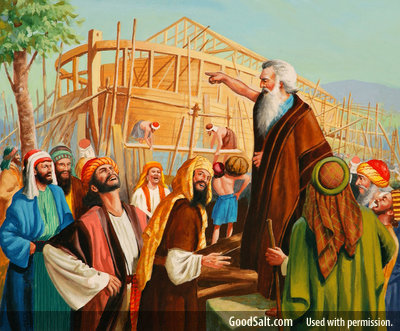 Because “Noah found grace in the eyes of the LORD” (Genesis 6:8), he trusted and permitted Christ’s Spirit to work in and through him. He pleaded with the people to turn from their evil ways, but the people drowned out the pleadings of Christ’s Spirit and Christ suffered that crucifixion:
Because “Noah found grace in the eyes of the LORD” (Genesis 6:8), he trusted and permitted Christ’s Spirit to work in and through him. He pleaded with the people to turn from their evil ways, but the people drowned out the pleadings of Christ’s Spirit and Christ suffered that crucifixion:
“For Christ also hath once suffered for sins, the just for the unjust, that He might bring us to God, being put to death in the flesh, but quickened by the Spirit: By which [by the same Spirit] also He went and preached unto the spirits in prison; Which sometime were disobedient, when once the longsuffering of God waited in the days of Noah, while the ark was a preparing, wherein few, that is, eight souls were saved by water.” (1 Peter 3:18-20)
Many believe Peter is teaching that, after Jesus was crucified on the cross, His Spirit went and preached to the spirits (souls) of all the deceased people who had once lived during the flood. But the phrase “spirits in prison” is referring to all those who are trapped in the prison house of sin and guilt. While David was still alive, he prayed: “Bring my soul out of prison, that I may praise thy name” (Psalm 142:7). Just like the angels who sinned, God had delivered the antediluvians over to “chains of darkness” (unremedied mental anguish and guilt) of which they chose (2 Peter 2:4).
In our article entilted: Doesn’t Peter Say That Jesus Went to Preach to the Spirits in Prison After His Death?, we learn what Peter is saying is that, through Noah, Christ’s Spirit preached to those who were imprisoned by their sins “while the ark was being prepared.” Their conscience became seared, and the people denied Christ of His will to save them and told Him to “Get lost!”
“Hast thou marked the old way which wicked men have trodden? Which were cut down out of time, whose foundation was overflown with a flood: Which said unto God, Depart from us: and what can the Almighty do for them?” (Job 22:15-17)
By rejecting the pleadings of Christ’s Spirit, they crucified Him afresh (Hebrews 6:6); for Christ is “the Lamb slain from the foundation of the world” (Revelation 13:8).
“In all their affliction He was afflicted, and the angel of His presence saved them: in His love and in His pity He redeemed them; and He bare them, and carried them all the days of old. But they rebelled, and vexed His Holy Spirit: therefore He was turned to be their enemy, and He fought against them.” (Isaiah 63:9, 10)
That last sentence does not mean Christ turns and fights against us. When we turn and fight against Him, vexing (grieving) His Holy Spirit, the spirit of sin enters and warps our understanding of God’s true character:
“Behold, the LORD'S hand is not shortened, that it cannot save; neither His ear heavy, that it cannot hear: But your iniquities have separated between you and your God, and your sins have hid [clouded] His face from you, that He will not hear.” (Isaiah 59:1, 2)
Our sins hide (cloud) God’s ever merciful face (Psalm 100:5), making it appear that He is acting out in violent retaliation against us, when in reality we are simply reaping the inherent consequences of stepping out from under His protective hedge.
“To the pure, you show yourself pure, and to the morally corrupt, you appear to be perverse.” (Psalm 18:26, International Standard Version)
God will “appear” to be perverse because He is giving you over to your own thoughts and allowing you to perceive Him this way. Please don’t be like Cain who allowed sin to cloud His view of God’s mercy and when faced with the conviction of sin exclaim: “My crime is too great for me to be forgiven” (Genesis 4:13, Brenton Septuagint Translation). Nothing can be further from the truth!
In Exodus 34:7 God says that He visits "the iniquity of the fathers upon the children, and upon the children's children, unto the third and to the fourth generation." The Hebrew word translated as "children" here is בֵּן (ben) which literally means "sons." The Literal Standard Version says it this way: "charging iniquity of fathers on sons and on sons’ sons, on a third and on a fourth [generation].” In Genesis chapter 6, God was visiting the iniquity of the fathers from both ancestral lines of Seth and Cain upon their "sons" (descendants). God had permitted a chain of circumstances to snowball over each generation until they willfully cut themselves off, thus closing their own probation.
 The people living during the flood chose to reject Christ’s non-condemning merciful Spirit. In our article entitled, Did God Drown Millions of People in the Flood?, we not only learn the biblical meaning of when God says such phrases as “I will destroy”, but we also learn that it is an error to believe that the world and its inhabitants were so corrupt that God had to destroy them. God never works through force or coercion. He never makes threats such as, “Get in the Ark or I will kill you!” because He is not an extortionist.
The people living during the flood chose to reject Christ’s non-condemning merciful Spirit. In our article entitled, Did God Drown Millions of People in the Flood?, we not only learn the biblical meaning of when God says such phrases as “I will destroy”, but we also learn that it is an error to believe that the world and its inhabitants were so corrupt that God had to destroy them. God never works through force or coercion. He never makes threats such as, “Get in the Ark or I will kill you!” because He is not an extortionist.
There was no supernatural hybrid race of creatures that God needed to exterminate. Instead, the unbelievers at the time of the flood willfully unplugged themselves from the only Source of life that was sustaining theirs. Out of pure selfless love, God visited their iniquity upon them by submitting to their free choice, allowing them to be destroyed by the earth they had corrupted (see, Genesis 6:11,12; Leviticus 18:25-28; Isaiah 24:4,5). Please read the aforementioned article for full details on this concept.
Will you stop resisting, and let Him save you?

/Did_God_Kill_Jesus_(cover).jpg)
.png)
